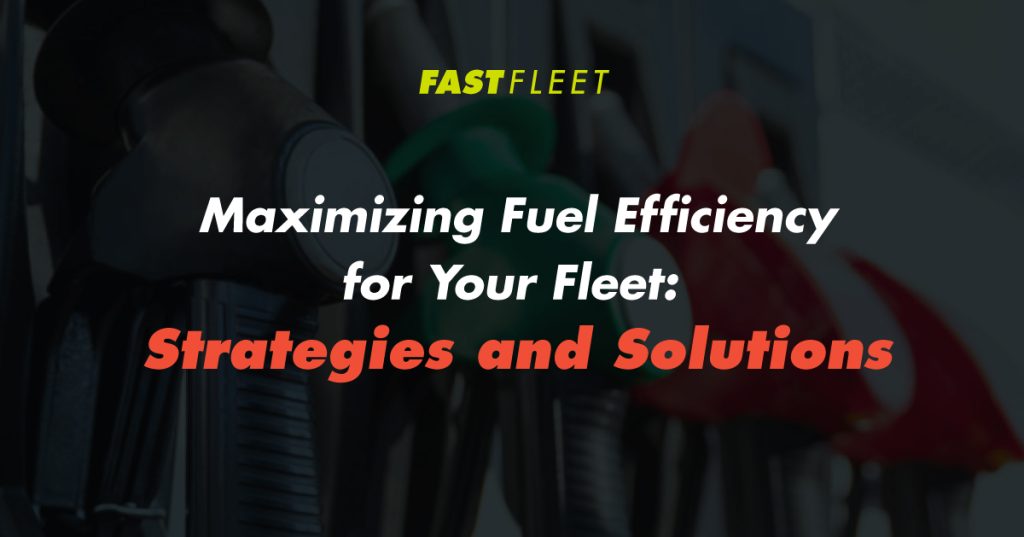Maximizing Fuel Efficiency for Your Fleet: Strategies and Solutions
Fuel efficiency is a top priority for fleet managers and owner-operators in the trucking industry.
With the rising costs of fuel and increasing environmental concerns, finding ways to optimize fuel consumption not only reduces operational expenses but also contributes to a more sustainable future.
In this blog, we’ll explore strategies and solutions to help you maximize fuel efficiency for your fleet while adhering to the Fast Fleet commitment to best-in-class services.
Strategies for Fuel Efficiency
Fuel-efficient Driving Habits
-
1. Proper Acceleration and Deceleration: When drivers are trained in fuel-efficient practices, they learn to avoid aggressive acceleration from a stop. Instead of slamming the accelerator, they gently apply pressure to smoothly gain speed.
Similarly, when they approach a red light or stop sign, they ease off the accelerator early, allowing the vehicle to slow down gradually.
-
These practices reduce the need for sudden and intense bursts of acceleration, which can significantly increase fuel consumption over time.
-
2. Maintaining Consistent Speed: Consistency in speed is key to fuel efficiency, especially during long-haul trips on the highway. Drivers are encouraged to use cruise control whenever possible.
-
This technology helps them maintain a steady speed, reducing the need for frequent acceleration and deceleration.
-
Additionally, drivers are advised to avoid rapid speed fluctuations in response to minor changes in traffic flow. By driving at a consistent speed, fuel consumption can be optimized.
-
3. Minimizing Idling Time: Excessive idling consumes fuel unnecessarily and contributes to increased operational costs. To combat this, fleet managers equip their vehicles with idle-reduction technologies.
-
Drivers are trained to use these technologies effectively during extended stops.
For instance, when taking a break at a rest area, drivers are encouraged to turn off the engine and rely on idle-reduction systems for heating or cooling.
-
Furthermore, drivers are urged to utilize rest area amenities such as dining facilities or restrooms instead of idling the engine.
4. Avoiding Rapid Acceleration: Rapid acceleration not only wastes fuel but also adds wear and tear to the vehicle, leading to higher maintenance costs. Drivers are taught to accelerate smoothly from a stop or when merging onto the highway.
-
Instead of quickly slamming the accelerator to gain speed, they smoothly apply pressure to achieve a gradual acceleration.
-
This practice not only conserves fuel but also extends the life of the vehicle, reducing overall operating expenses.
Route Optimization
Efficient route planning is essential. Utilize GPS and telematics systems to:
-
1. Access Real-time Traffic Updates: Utilize GPS and telematics systems that provide real-time traffic data. These systems offer insights into current road conditions, including traffic congestion, accidents, and road closures.
-
When drivers have access to this information, they can avoid traffic jams and select alternate routes to their destinations.
-
By rerouting vehicles away from congested areas, you can significantly reduce idling time and fuel consumption.
-
2. Optimize Delivery Schedules: Efficient route planning involves optimizing delivery schedules. Use route optimization software or platforms that consider factors like traffic patterns, delivery windows, and vehicle capacity.
-
By carefully scheduling deliveries and pickups, you can minimize backtracking and unnecessary mileage. This not only reduces fuel consumption but also improves overall fleet productivity.
For example, grouping deliveries in the same geographical area or along a logical route can lead to substantial fuel savings and operational efficiency.
Route Planning Software:
Route4Me: This platform offers route optimization for fleets. It considers various factors, including traffic, delivery windows, and vehicle capacity, to create efficient routes.
OptimoRoute: OptimoRoute provides route planning and optimization for delivery and service fleets. It allows you to optimize routes based on various constraints, reducing fuel consumption.
Badger Maps: Particularly useful for field sales teams, Badger Maps helps optimize routes for sales calls and deliveries, taking into account customer locations and visit frequency.
Telematics Systems:
Verizon Connect: This telematics solution offers real-time tracking and route optimization capabilities, helping fleets reduce fuel consumption by providing efficient routes and real-time traffic updates.
Samsara: Samsara’s fleet management platform includes route optimization features, allowing you to plan and adjust routes based on traffic and other factors.
Fleet Management Software:
Geotab: Geotab’s fleet management software includes route optimization tools to help you plan efficient routes and reduce fuel consumption.
Teletrac Navman: This fleet management solution offers route planning and optimization features to improve fuel efficiency and productivity.
Map APIs:
Google Maps API: Integrating Google Maps into your fleet management system can provide real-time traffic updates and route optimization capabilities.
HERE Location Services: HERE offers location-based services that include route planning and optimization for fleets.
By using these tools and software solutions, fleet managers can efficiently plan routes, minimize backtracking, and reduce unnecessary mileage, ultimately leading to significant fuel savings and improved operational efficiency.
Maintenance for Fuel Savings
Regular vehicle maintenance is paramount. Implement the following maintenance practices:
Regular Engine Maintenance:
Regular engine maintenance is crucial for maintaining fuel efficiency. Here are some specific actions to take:
Scheduled Servicing: Create a maintenance schedule for your fleet vehicles based on manufacturer recommendations. This should include oil changes, air filter replacements, and other routine maintenance tasks.
Diagnostic Scans: Use diagnostic tools to regularly scan the engine for any error codes or issues that could impact fuel economy. Address these issues promptly.
Fuel System Inspection: Periodically inspect the fuel system for leaks, clogs, or any components that may be causing inefficient fuel combustion.
Engine Tuning: Ensure that the engine is tuned correctly for optimal fuel efficiency. This includes adjustments to the fuel-to-air ratio and other settings.
Tire Maintenance and Inflation:
Proper tire maintenance can significantly impact fuel efficiency. Here are specific steps to follow:
Regular Pressure Checks: Implement a routine for checking tire pressure. This should be done at least once a month or more frequently if needed. Ensure that tires are inflated to the manufacturer’s recommended pressure levels.
Tire Balancing: Imbalanced tires can lead to uneven wear and increased rolling resistance. Balance tires as needed during maintenance.
Tread Depth Inspection: Monitor tire tread depth regularly and replace tires that are worn beyond the recommended limits.
Alignment Checks: Misaligned wheels can cause tires to wear unevenly and increase rolling resistance. Check and adjust wheel alignment as needed.
Aerodynamics and Vehicle Maintenance:
Optimizing vehicle aerodynamics and overall maintenance is essential for fuel efficiency. Here are specific actions to take:
Aerodynamic Improvements: Consider aerodynamic modifications to your fleet vehicles, such as adding side skirts, trailer tails, and aerodynamic mirrors. These improvements can reduce drag and improve fuel economy.
Cleanliness: Keep vehicles clean, including removing dirt, snow, and ice buildup, which can increase aerodynamic drag.
Regular Inspections: Perform routine vehicle inspections to identify and address any maintenance issues that could affect fuel efficiency, such as worn-out seals, loose parts, or damaged components.
Weight Management: Avoid carrying unnecessary weight in your vehicles, as it can increase fuel consumption. Regularly check and remove any excess weight from trucks and trailers.
By implementing these specific maintenance practices, you can maximize fuel efficiency in your fleet, reduce operational costs, and promote sustainability.
Fuel-efficient Technologies
Consider adopting advanced technologies for fuel efficiency:
Eco-friendly Vehicle Options: Explore options like hybrid and electric vehicles for your fleet to reduce reliance on traditional fuel sources.
Investing in hybrid and electric vehicles can significantly reduce fuel consumption. For example, a hybrid truck combines a traditional internal combustion engine with an electric motor, using less fuel during city driving.
These vehicles can cut fuel costs by up to 30%. An example would be the Toyota Prius, which combines a gasoline engine with an electric motor to reduce fuel consumption.
Fuel-efficient tires are designed to reduce rolling resistance and improve fuel economy. Michelin’s Energy Saver A/S is an example.
These tires are engineered to reduce friction with the road, which decreases the energy needed to move the vehicle. This can result in fuel savings of around 2 miles per gallon.
Data and Analytics
Telematics systems collect data on various aspects of fleet operations. For instance, by analyzing data from telematics, you might discover that some drivers consistently idle their trucks for extended periods.
With this information, you can implement driver training programs to reduce idle times, potentially saving thousands of dollars in fuel costs.
Sustainable Practices
Transitioning to alternative fuels like natural gas or biodiesel can significantly reduce your fleet’s carbon footprint. Explore eco-friendly fleet solutions, such as optimizing vehicle loading to maximize capacity and reduce the number of trips.
Cost Reduction
Understanding your fleet’s fuel costs is vital. Let’s say your fleet spends $1,000,000 annually on fuel. By leveraging strategies like bulk fuel purchasing and fuel card programs, you can save 5%, resulting in $50,000 in annual savings.
Additionally, by investing in fuel-efficient technologies, you might reduce annual fuel costs by another 10%, saving an additional $100,000.
Compliance and Regulations
Staying informed about regulations is essential. For instance, by complying with Electronic Logging Device (ELD) requirements, you avoid fines and maintain compliance with Hours of Service regulations.
Proper compliance ensures efficient route planning, reducing fuel consumption by avoiding unnecessary mileage.
Maximizing fuel efficiency for your fleet is not only a sound financial decision but also a commitment to sustainability.
By implementing these strategies and solutions, you can reduce operational costs, decrease your carbon footprint, and maintain the high standards of service that Fast Fleet is known for.
Embrace fuel efficiency as a driving force for a more efficient and environmentally responsible fleet. Your bottom line and the planet will thank you.
















